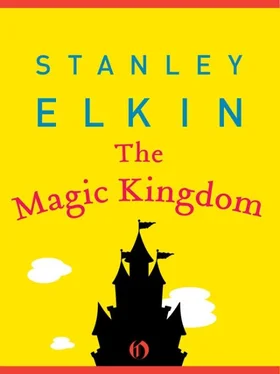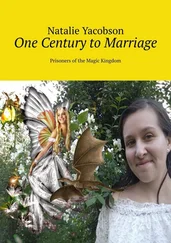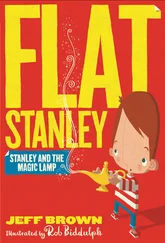“Compatible?” Noah Cloth said.
“If we could get along,” Benny said. “Be good companions.”
“And he showed me these wooden shoes. That he said were his great-grandad’s.”
“We’re compatible,” Mudd-Gaddis cackled.
“Only I was afraid to touch them,” said Tony Word.
“We’re compatible,” said Mudd-Gaddis, who was enjoying a respite, a period of lucidity.
“There could have been splinters.”
“We’re compatible. We’re children who die,” said Mudd- Gaddis in his hoarse, old-man’s wheeze.
When Noah begins to cry, when Tony does. And Charles Mudd-Gaddis, his lucidity shining, his head clear as crystal, seeing the bright, sharp angles on causes, effects; restored, it could be, to his true, rightful age, seeing everything, even that what he feels now, at this minute, the perfectly furnished ripeness of his eight seasoned years, might only be a trick; his sluiced and dancing chemicals misfiring, some neurological overload, some snapped and brittle synapse, his remission only some long-shot bit of coincident, collusive senescence, quite suddenly rips off his wig and hurls it to the ground. “ Yellow,” he snarls. “I had brown hair. My hair was brown!” And begins to stamp on it. Frightened Maxine reaching out to calm him, restore him, unaware of course that he is already restored, that his compatible, furious friend, kicking at the ripped yellow hair, tromping it, wiping his shoes on it as though it were a mat, stumbling on it in his aged, broken gait, is beyond reassurance.
“This won’t do, old chap,” Benny says, taking his arm. “No, this won’t do at all. Come on, old boy. Come on, old fellow. This really won’t do. Tell him, Miss Cottle,” Benny says, imploring the woman, tears flowing now from his own eyes. “Please, Miss Cottle, can’t you do something?”
Whose right hand covers her mouth in shock, in horror, whose left already clutches her crotch, palming a handful of fabric there, Colin Bible sees, as if she’s had an accident.
They were quickly surrounded by cast members. (Mary Cottle, despising scenes as much as arrangements, thinking: They’d have come anyway. Having our number. They’d have come anyway. Something telltale about us even in repose. They’d have come anyway.)
The one in the black mourner’s band — it’s the Haunted Mansion — kindly offers to take them to the front of the line. While a handsome, well-built young man retrieves Mudd-Gaddis’s wig and, brushing it off, hands it to Colin, who, Mary Cottle observes, seems touched by the gesture. A girl affectionately pats Charles’s bald little head and, lifting him up, bypasses the people standing in line and carries him on her shoulders to a side door while the others follow, hustled along by the remaining cast members, openly winking, not at each other but at the children, at the two adults, flashing secret agreement, doling these out somehow — the winks — managing the delicate choreography of their high-sign arrangements so that no one is winked at twice by the same person or is even observed to have winked. Except that Mary Cottle sees the young man who had handed Colin Charles’s hairpiece wink at Colin and Colin return it, giving as good as he got, better. She sees the kid flush. I’m admired, Colin thinks guiltily. In a country where AIDS is rampant.
Inside, they stand, could be, along the building’s stitching, shabby as a kitchen in a posh restaurant, as anything backstage or where workers gather to punch out by time clocks. They can hear a babble of recordings, just make out the winding, canted, interlocking paths, vaguely like baggage carrousels in airports, of other tour groups, the black, open trains that carry them. They can see periodic flashes of special effects like a kind of heat lightning, like phosphorent bursts of insect. Afterimage burns along their retinas like wick: the laser bombardments, the fireball theatrics of warfare, all the burnt-out guttering torches and candles and tapers of haunted radiance.
The fellow in the armband signals a girl standing by a control board, who presses a button that halts the tour. She takes a microphone down from the wall. “We have to stop now to take on some ’late’”—she pauses, lowers a voice charged with joke menace—“visitors.” “Visitors” is pronounced like a question.
The machinery grinds down — it’s as if some solemn, tender armistice is taking place — and Colin, Mary, and the boys are helped in the dark into an empty gondola, are settled into seats that have some sort of built-in stereo arrangement. They begin their tour. Which is rather enhanced than otherwise — something has been done to the air in here, a tampered humidity like the wet, faint chill of a catacomb — by their having been plucked from the bright sunlight into the damp darkness.
Their faces move against cobwebs, break them like phantom finishers in a phantom race. The same raven seems to appear over and over. Resisting death, a suit of armor, its old fierce metals sweating, its hinges groaning, transcends rust, swells into life. The eyes of night creatures blink on the wallpaper. A teapot pours a poisoned tea. Specters, translucent as the tea, move in the air like laundry. A living woman is entombed in a crystal ball. All about them they can hear the wails of the dead, insistent and hopeless as the demands of beggars. It’s this note, the noise of desperate petition, that causes the children more trouble than the conventional props of death: the bats, the coffins set out like furniture. They’re still upset. Mary Cottle senses it; Colin Bible, still seeing the afterimage of the twenty-year-old boy who’d winked at him, who’d touched his hand a fraction of a section longer than he was required to when he’d handed him Charles’s wig, does.
“They’re trying to say something,” Noah Cloth whispers to his companion, Tony Word. “What is it, you think, they’re trying to say?”
“Dunno. It’s like the lowing of cattle.” Both boys shudder.
Only Charles Mudd-Gaddis’s trapped, soft screams go almost unheard among these professional spookhouse shrieks and cries of actors, the funhouse arias of the dead. If the others are upset, Mudd-Gaddis is terrified; if they hear him at all they mistake the sound for the low-priority complaint of the infant dead. He has been whimpering like this since the strong tall girl had raised him to her shoulders and carried him into the mansion, and who sits beside him now, holding his hand, mindlessly squeezing his arthritic joints, amiably mashing them while she makes her own soft noises at him, noises which he not only cannot hear but which he will not listen to.
Because, in darkness, his ancient eyes are almost blind; and outdoors was riding — his back to them, too — so high up on the big girl’s shoulders he dared not look down, did not pick up, and would not have accepted if he had, the hale fellow, semaphore reassurances of the cast members. Indeed, he is barely aware that the girl who sits beside him now is the same young woman who had swooped down on him in his rage and lifted him from the ground he had been stamping on and kicking at only seconds before, raised him, removed him from earth, torn him off that lying, hideous yellow wig he had been trying to muddy back to the brown he remembered. He is not in remission now, not enjoying a lucid moment, is uncertain, for that matter, where he is, and has the sense only that he’s somewhere underground, riding along a narrow-gauge track in a coal mine, perhaps, or being pulled on a sled, though he’s not cold, through the six-months’ midnight of the Arctic Circle. He is not in remission, does not enjoy the crystal clarifics of only twenty minutes before — though he remembers all that clearly enough, in perfect detail, in fact, not a single thing slipped or blurred, not one, even the at once humiliating and infuriating business of the wig as clear to him as if it happened years ago — and recalls the day he was seven years old. His whimpers a sort of nostalgia, his memory of the day so sharp and poignant the whimper becomes a snuffling, the snuffling a sob, the sob a cry.
Читать дальше












